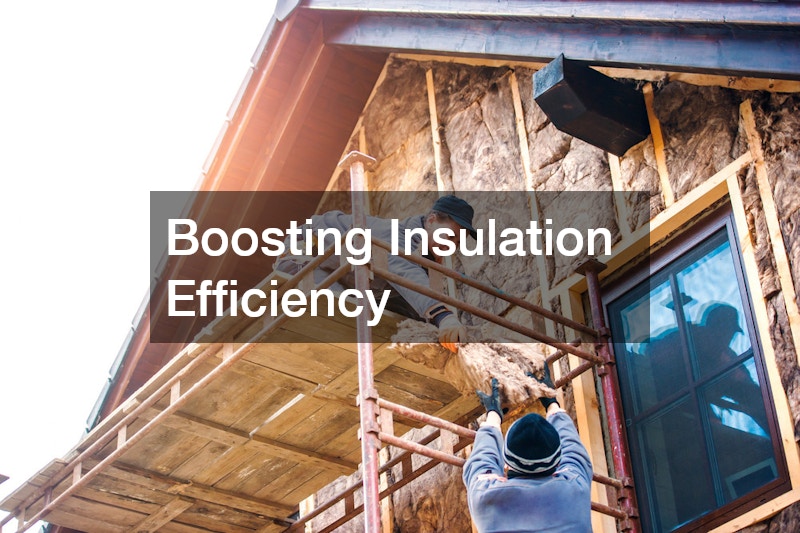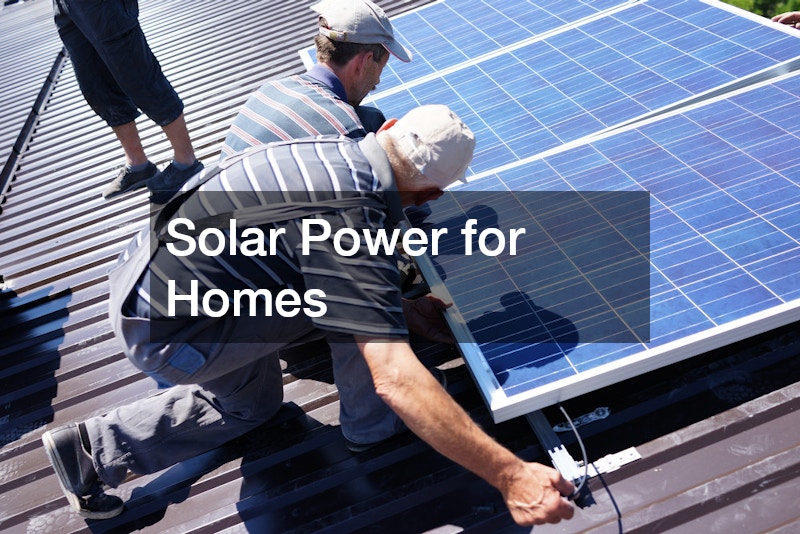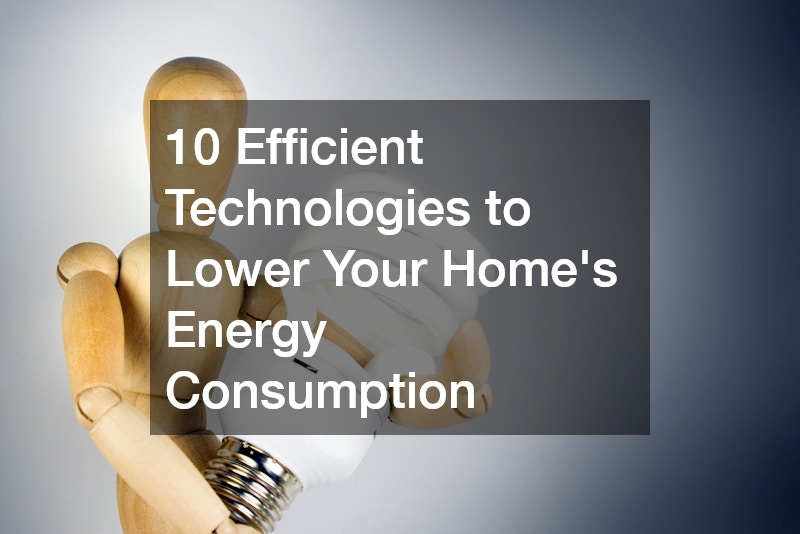In today’s rapidly evolving world, reducing energy consumption has become not just an environmental responsibility, but also a financial necessity for many households. The inclusion of efficient technologies in home design can drastically lower energy usage, resulting in savings on utility bills and a reduced carbon footprint. This introductory section will explore methodologies and innovations that have been developed to optimize energy usage in residences, focusing on ten specific areas where advancements have proved to be exceptionally beneficial. These range from heating and cooling solutions to water wastage reduction and beyond. Each section aims to delve into the significance of these technologies and provide detailed insights into their implementation and benefits.
As we embark on this exploration, it becomes clear that integrating these technologies not only enhances comfort and home functionalities but also contributes significantly towards global sustainability efforts. From the nuances of selecting the right electrical contractor to ensuring your home is equipped with smart cooling upgrades, the journey towards energy efficiency starts with educated choices and actionable steps. The subsequent sections provide a comprehensive overview of these ten technology areas, aiming to empower homeowners with the knowledge to make informed decisions about their energy usage.
Understanding and leveraging efficient technologies can be transformative. Whether it’s through replacing outdated energy systems or incorporating innovative solutions such as geothermal installations or solar panels, the potential to lower energy consumption is vast. The following sections will offer a deep dive into each technology, providing practical advice, detailed benefits, and implementation strategies, culminating in a broader understanding of how homeowners can take actionable steps towards improved energy efficiency.
Optimizing Home Energy Use
Efficient technologies are at the forefront of optimizing home energy use, providing homeowners with avenues to significantly cut down their electricity consumption. These technologies encompass a range of smart home devices, energy-efficient appliances, and automated systems that adjust energy use based on real-time needs. By investing in these solutions, homeowners can ensure that their energy use is optimized, leading to reduced costs and environmental impact.
Electrical contractors play a critical role in the integration of these technologies. They are skilled in assessing energy needs and implementing solutions that best fit those requirements. Whether it involves the installation of smart meters or the upgrade of outdated electrical systems, these professionals ensure that your home operates at peak efficiency by maximizing the output of your energy systems while minimizing waste.
An electrical contractor can also provide guidance on the latest advancements in energy-efficient tech. By keeping abreast of innovations, they ensure that installations and recommendations align with modern standards and contribute to lessened energy consumption. These implementations, when paired with tailored home energy management systems, allow for adaptive usage patterns, thus further enhancing energy conservation efforts.
Efficient Heating Solutions

The traditional home heating systems are notorious energy guzzlers. Nonetheless, advancements in the sector have introduced more efficient tech that promise to transform heating solutions. These technologies utilize better materials, smarter control systems, and alternative fuels, all engineered to dramatically reduce a home’s energy consumption during the colder months.
Home heating oils have seen a resurgence but with a modern twist — low-sulfur and blended oils are now at the forefront, positioning themselves as more environmentally friendly alternatives. When utilized correctly, these oils can deliver sustained heating without the excessive energy demands typical of previous oil heating systems. This means that by selecting the right type of heating oils, homeowners can maintain comfort while being energy-efficient.
Incorporating efficient technologies into your heating solutions could also include the use of advanced thermostats and heating systems that learn your schedule and adjust heating levels automatically. These smart systems ensure that heat is only used when needed, thereby optimizing energy use and significantly lowering costs. Embracing such solutions positions homeowners to effectively manage and reduce their energy footprint.
Renovations for Energy Savings
Home renovations present a prime opportunity for incorporating efficient technologies to reduce energy consumption. Renovations allow homeowners to rethink and redesign elements of their living spaces with energy efficiency in mind, leading to long-term savings and a reduced environmental impact. This can include everything from structural modifications to the integration of advanced automated systems.
A home renovation contractor becomes an invaluable ally in this process, providing expertise and guidance on areas that can benefit from energy-saving upgrades. Whether it’s enhancing insulation, modernizing windows, or updating HVAC systems, their experience is crucial in executing renovations that are not only aesthetically pleasing but energy efficient. Expert contractors will recommend the best materials and systems tailored to the specific needs of your residence.
Engaging a knowledgeable home renovation contractor can significantly streamline the renovation process while ensuring that each aspect is geared towards better energy savings. By prioritizing the inclusion of efficient technologies during renovations, homeowners can enjoy improved efficiency, comfort, and savings, all while boosting the overall value of their property. Such enhancements can drastically change the energy dynamics of a home, making it a more sustainable living space.
Boosting Insulation Efficiency

One of the most critical components of a home’s energy efficiency is its insulation. Effective insulation significantly reduces the amount of energy needed to heat and cool a home, thus cutting down on utility costs. Today, there are many efficient tech and materials available that provide superior insulation performance, ensuring that homes remain comfortable year-round with minimal energy expenditure.
Window contractors play a pivotal role in improving insulation efficiency. Windows are major sources of energy loss in homes, and upgrading to advanced window technologies can make a substantial impact. Double or triple-glazed windows, for example, provide excellent insulation through multiple layers of glass separated by gas-filled spaces, drastically reducing heat transfer, and thus energy consumption.
In addition to windows, wall and roof insulation are areas that can be optimized through efficient technologies. Materials such as spray foam, rigid foam, and high-performance fiberglass are excellent for ensuring a home remains sealed against outside temperatures. By collaborating with proficient window contractors and insulation specialists, homeowners can achieve a comprehensive insulation strategy that maximizes energy savings while enhancing overall comfort.
Benefits of Geothermal Heating
Geothermal heating offers one of the most sustainable and efficient tech for residential heating. This system leverages the stable temperatures found underground, providing consistent heating and cooling throughout the year without excessive energy use. Geothermal systems are increasingly being recognized for their ability to significantly lower energy costs and reduce reliance on traditional fuels.
A geothermal system is not only environmentally friendly but also highly efficient, utilizing renewable energy from the earth to deliver heating and cooling. By tapping into this virtually limitless resource, homeowners can significantly diminish their carbon footprint. The system operates quietly, efficiently, and safely, making it an ideal long-term investment for those prioritizing energy conservation and sustainability.
Implementing a geothermal system involves initial installation costs, but the long-term savings typically offset these expenses. Trustworthy installation and maintenance partners are key to ensuring that the system operates optimally. With efficient technologies such as geothermal heating, homeowners can experience the benefit of reduced energy bills, minimized environmental impact, and enhanced home comfort.
Smart Cooling Upgrades

Cooling systems have traditionally been among the highest consumers of energy in homes, particularly in warmer climates. However, efficient technologies in the cooling industry offer remarkable solutions that reduce energy consumption while maintaining desirable indoor climates. Smart cooling upgrades are increasingly being integrated into homes, emphasizing sustainability and efficiency.
An air conditioning service can provide invaluable assistance in selecting and installing advanced cooling technologies. This includes programmable thermostats, energy-efficient units, and smart home integrations that allow for precise control over cooling systems. These services ensure that cooling systems are not only powerful but also optimized to use less energy by adapting to occupancy and external temperature variations.
Adopting a smart cooling approach involves more than just installing new AC units. It includes an interconnected network where air conditioning, ventilation, and overall home energy systems work together to optimize energy use. By utilizing services that specialize in air conditioning upgrades, homeowners can effectively decrease their energy consumption while still enjoying a comfortable home environment.
Choosing Better Heating Fuels
The type of fuel used for heating greatly influences a home’s energy efficiency. Traditional heating fuels, although effective, can be expensive and environmentally taxing. Exploring alternative fuel options is crucial for homeowners seeking more efficient tech and greener solutions for their heating needs.
Gas companies are redefining traditional heating by providing access to cleaner, more efficient fuel alternatives. Natural gas, for example, burns more cleanly than other fossil fuels, resulting in fewer emissions. This option is also typically less expensive than oil and electric heating systems, presenting a viable choice for enhancing home energy efficiency.
Choosing the right heating fuels involves understanding the ecological and economic benefits associated with each type. Collaborating with a gas company can provide insight into low-emission, cost-effective solutions tailored to an individual home’s needs. By capitalizing on efficient technologies and better fuel options, homeowners can effectively balance comfort with cost and environmental responsibility.
Solar Power for Homes

Solar power represents one of the most promising efficient technologies for reducing a home’s energy consumption. As a renewable energy source, solar power can significantly cut down or even eliminate reliance on traditional power grid systems, leading to substantial cost savings and environmental benefits.
Partnering with a solar energy company allows homeowners to unlock the full potential of solar technology. They offer expertise in designing and installing solar panels and energy storage solutions that maximize efficiency and performance. The use of solar power not only reduces energy bills but also increases property value, making it a smart long-term investment for any home.
Implementing solar power solutions typically involves an upfront investment, but the return over time can be considerable. Federal and state incentives further enhance the affordability of adopting solar technologies. Through collaboration with a reputable solar energy company, homeowners can make the transition to cleaner, sustainable energy, contributing to a more energy-efficient and cost-effective household.
Reducing Water Waste
Water conservation is an integral part of improving home energy efficiency. Efficient tech in water management not only help in reducing water waste but also play a critical role in lowering energy consumption related to water heating and treatment.
A water conditioner is a key device in optimizing water use. This technology treats hard water, increases efficiency in water heaters, and ensures that appliances like dishwashers and laundry machines operate at peak performance. By contributing to the longevity and efficiency of appliances, water conditioners significantly reduce household energy use associated with water handling.
Water-saving devices and practices, such as low-flow fixtures, rainwater harvesting, and greywater systems, complement the use of efficient technologies in water management. These solutions not only conserve water but also facilitate energy efficiency by reducing the loads on water heaters and treatment systems. By implementing a comprehensive water efficiency strategy, homeowners can substantially reduce their energy consumption while conserving a valuable resource.
Maintaining Energy-Efficient Water Heaters
The water heater is a major contributor to a household’s energy use. Investing in energy-efficient water heaters and ensuring they are properly maintained can lead to significant energy savings and enhanced home energy efficiency.
Routine water heater repair and maintenance, conducted by professionals, ensure that water heaters operate efficiently. This involves checking for leaks, sediment buildup, and other issues that could impact performance. Regular servicing helps maintain the system’s efficiency, extending its lifespan and keeping energy consumption low.
A water heater repair service specializing in efficient technologies will suggest options like heat pump water heaters or tankless systems, which provide significant energy savings compared to traditional models. These advanced solutions heat water on demand or use renewable energy sources, leading to reduced energy bills and a smaller carbon footprint. Incorporating expert maintenance and choosing modern water heaters can lead to substantial improvements in home energy management.
Exploring and implementing the ten efficient technologies discussed in this article can dramatically reduce a home’s energy consumption. From optimizing heating and cooling systems to investing in renewable energy solutions such as solar power, homeowners are empowered to make informed decisions that benefit both their finances and the environment. Emphasizing efficient technologies ensures that everyday living is sustainable, cost-effective, and aligned with global energy conservation goals.


